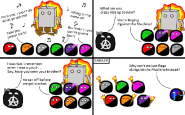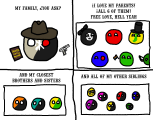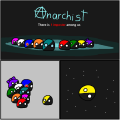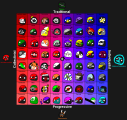Script error: No such module "Mbox".
Anarcho-Transhumanism, often shortened to AnH+ or @H+, is a ![]() culturally progressive and economically ambiguously left-wing to post-economic
culturally progressive and economically ambiguously left-wing to post-economic ![]() Anarchist ideology which is stemmed from
Anarchist ideology which is stemmed from ![]() Anarcho-Individualism.
Anarcho-Individualism.
The central idea to Anarcho-Transhumanism is that, rather than being just a combination of ![]() Anarchism and
Anarchism and ![]() Transhumanism, the two are in fact intertwined and should be synchronized.
Transhumanism, the two are in fact intertwined and should be synchronized.
They hold the idea that progress should not be held back by "dogmatic and oppressive institutions" (i.e. ![]() corporations and/or
corporations and/or ![]() governments). Rather, innovation and improvement of the human condition (via nanotechnology and cybernetics) can be brought about by emphasizing survival (in fact, abolishing death completely) and cooperation, instead of competition and conquest.
governments). Rather, innovation and improvement of the human condition (via nanotechnology and cybernetics) can be brought about by emphasizing survival (in fact, abolishing death completely) and cooperation, instead of competition and conquest.
They may advocate various praxis to advance their ideals, including computer hacking, three-dimensional printing, or biohacking.
History
Origins
The fundamental historical roots of ![]() Anarcho-Transhumanism are deeply grounded in the
Anarcho-Transhumanism are deeply grounded in the ![]() Russian artistic avant-garde movements, which flourished in the context of the broad spectrum of
Russian artistic avant-garde movements, which flourished in the context of the broad spectrum of ![]() anarchist,
anarchist, ![]() socialist, and
socialist, and ![]() communist movements that immediately preceded the Russian Revolution, and very briefly followed it until the oppressive
communist movements that immediately preceded the Russian Revolution, and very briefly followed it until the oppressive ![]() Stalinist dictatorship gained political control and suppressed them. This very broad radical cultural milieu saw the birth of the artistic and literary Futurism, alongside a wide range of related movements such as Rayonism, Cubo-Futurism,
Stalinist dictatorship gained political control and suppressed them. This very broad radical cultural milieu saw the birth of the artistic and literary Futurism, alongside a wide range of related movements such as Rayonism, Cubo-Futurism, ![]() Suprematism, Orphism. The visual arts and poetry of these Russian avant-garde movements were dominated by a broad mythology of
Suprematism, Orphism. The visual arts and poetry of these Russian avant-garde movements were dominated by a broad mythology of ![]() technoscientific progress, a visionary modernity deeply rooted in
technoscientific progress, a visionary modernity deeply rooted in ![]() anarchist and
anarchist and ![]() socialist philosophy. Images of trains were widespread, as symbols of a revolutionary modernity that collectively drives humanity towards the future, through a new level of connectedness that transcended state and class boundaries. Other dominant iconological themes included the human body as mechanism and the blending of body and machine (from Oskar Schlemmer's mechanical ballet figures to
socialist philosophy. Images of trains were widespread, as symbols of a revolutionary modernity that collectively drives humanity towards the future, through a new level of connectedness that transcended state and class boundaries. Other dominant iconological themes included the human body as mechanism and the blending of body and machine (from Oskar Schlemmer's mechanical ballet figures to ![]() Capek's robots), the myth of electrification as modernization and as metaphor for revolutionary political power, the image of the city as dynamical hub of radical societal transformations and
Capek's robots), the myth of electrification as modernization and as metaphor for revolutionary political power, the image of the city as dynamical hub of radical societal transformations and ![]() technoscientific innovations, and the early developments of a mythology of outer space and of the connection between human progressive destiny and the exploration of the cosmos.
technoscientific innovations, and the early developments of a mythology of outer space and of the connection between human progressive destiny and the exploration of the cosmos.
It is within this general cultural and political background that the philosophical movement of Cosmism (sometimes referred to as ![]() Biocosmism) flourished. This was the direct origin of modern
Biocosmism) flourished. This was the direct origin of modern ![]() Transhumanism, and it exhibited several of the most important themes one encounters in its contemporary forms. Like its modern transhumanist counterpart, Russian Cosmism was a very composite movement, where some representative figures stirred closer to
Transhumanism, and it exhibited several of the most important themes one encounters in its contemporary forms. Like its modern transhumanist counterpart, Russian Cosmism was a very composite movement, where some representative figures stirred closer to ![]() mysticism and religion, while others embraced
mysticism and religion, while others embraced ![]() anarchist,
anarchist, ![]() socialist, and
socialist, and ![]() communist ideals. Cosmist thinkers advocated the radical extension of human life, the conquest of immortality through scientific means, the merging of human and machine, and the quest for space exploration and the creation of human settlements outside the Earth. The Cosmist philosophical movement in turn deeply influenced the scientists who in later decades realized the Soviet space program, starting with Konstantin Tsiolkovsky, the father of Soviet Cosmonautics.
communist ideals. Cosmist thinkers advocated the radical extension of human life, the conquest of immortality through scientific means, the merging of human and machine, and the quest for space exploration and the creation of human settlements outside the Earth. The Cosmist philosophical movement in turn deeply influenced the scientists who in later decades realized the Soviet space program, starting with Konstantin Tsiolkovsky, the father of Soviet Cosmonautics.
The convergence of ![]() Anarchism and
Anarchism and ![]() Socialism with Cosmism and Futurism that took place in the years leading up to the Russian Revolution remains a profound source of inspiration for the modern movements combining
Socialism with Cosmism and Futurism that took place in the years leading up to the Russian Revolution remains a profound source of inspiration for the modern movements combining ![]() Anarchism and
Anarchism and ![]() Transhumanism.
Transhumanism.
Contemporary History, Influences and Thought
Its modern philosophy draws heavily from the ![]() individualist anarchism of
individualist anarchism of ![]() William Godwin,
William Godwin, ![]() Max Stirner and
Max Stirner and ![]() Voltairine de Cleyre as well as the
Voltairine de Cleyre as well as the ![]() cyberfeminism presented by Donna Haraway in A Cyborg Manifesto.
cyberfeminism presented by Donna Haraway in A Cyborg Manifesto.
Another influence is the ![]()
![]()
![]()
![]()
![]() Cybernetic Culture Research Unit (CCRU) formed 1995 at Warwick University in Coventry, England and lasted until 2003 which included notable people such as
Cybernetic Culture Research Unit (CCRU) formed 1995 at Warwick University in Coventry, England and lasted until 2003 which included notable people such as ![]() Sadie Plant,
Sadie Plant, ![]() Nick Land and
Nick Land and ![]() Mark Fisher, famous for it's idiosyncratic "theory-fiction", and which their work involved things such as psychedelia,
Mark Fisher, famous for it's idiosyncratic "theory-fiction", and which their work involved things such as psychedelia, ![]() accelerationism, esotericism, rave culture and Jungle music, cybernetics and cyberpunk media genre.
accelerationism, esotericism, rave culture and Jungle music, cybernetics and cyberpunk media genre.
Cyberpunk and it's subsequent sub-genres have heavily influenced ![]() Anarcho-Transhumanism, notably Biopunk, Nanopunk and Solarpunk.
Anarcho-Transhumanism, notably Biopunk, Nanopunk and Solarpunk.
Much of early ![]() Anarcho-Transhumanist thought was a response to
Anarcho-Transhumanist thought was a response to ![]() Anarcho-Primitivism. However, some
Anarcho-Primitivism. However, some ![]() Anarcho-Transhumanists are
Anarcho-Transhumanists are ![]() Post-Civ.
Post-Civ.
Some aesthetics commonly associated with ![]() Anarcho-Transhumanism, especially among online users, are the
Anarcho-Transhumanism, especially among online users, are the ![]() Vaporwave, Outrun and Kaybug aesthetics, notable for their retro-futuristic technological influences, indicating that
Vaporwave, Outrun and Kaybug aesthetics, notable for their retro-futuristic technological influences, indicating that ![]() Anarcho-Transhumanism isn't just about modern technology, but also the utilization of much of the technology that previous generations associated with being "futuristic" at the time. Older tech is also often used in @H+ praxis as it is less easier to track activity than more modern devices.
Anarcho-Transhumanism isn't just about modern technology, but also the utilization of much of the technology that previous generations associated with being "futuristic" at the time. Older tech is also often used in @H+ praxis as it is less easier to track activity than more modern devices.
![]() Anarcho-Transhumanism may be interpreted either as
Anarcho-Transhumanism may be interpreted either as ![]() criticism of, or an
criticism of, or an ![]() extension of
extension of ![]() humanism, because it challenges what being human means.
humanism, because it challenges what being human means.
Relationship to Transhumanism
Borrowing from ![]() techno-anarchism, anarchist activist
techno-anarchism, anarchist activist ![]() William Gillis and others argue that the disruptive nature of emergent technologies are either incompatible or extremely dangerous with hierarchical structures of today, including representative or majoritarian democracy. Failure to challenge physical and social conditions together has been argued to risk
William Gillis and others argue that the disruptive nature of emergent technologies are either incompatible or extremely dangerous with hierarchical structures of today, including representative or majoritarian democracy. Failure to challenge physical and social conditions together has been argued to risk ![]() oligarchic transhumanism,
oligarchic transhumanism, ![]() primitivism, or even
primitivism, or even ![]() extinction.
extinction.
![]() Anarcho-Transhumanists also criticize non-anarchist forms of transhumanism such as
Anarcho-Transhumanists also criticize non-anarchist forms of transhumanism such as ![]() Nazi Transhumanism and
Nazi Transhumanism and ![]() Libertarian Transhumanism as incoherent and unsurvivable due to their preservation of the state. They view such instruments of power as inherently unethical and incompatible with the acceleration of social and material freedom for all individuals.
Libertarian Transhumanism as incoherent and unsurvivable due to their preservation of the state. They view such instruments of power as inherently unethical and incompatible with the acceleration of social and material freedom for all individuals. ![]() Anarcho-Transhumanism is
Anarcho-Transhumanism is ![]() anti-capitalist, arguing
anti-capitalist, arguing ![]() capitalist accumulation of wealth would lead to dystopia while partnered with
capitalist accumulation of wealth would lead to dystopia while partnered with ![]() transhumanism.
transhumanism. ![]() Anarcho-Transhumanism advocates for equal access to advanced technologies that enable morphological freedom and space travel.
Anarcho-Transhumanism advocates for equal access to advanced technologies that enable morphological freedom and space travel.
Individual ![]() Anarcho-Transhumanists may or may not be singularitarians, variously considering an anarchist society and hypothesized singularity events as prerequisites, mutually exclusive, or inevitable outcomes of one another.
Anarcho-Transhumanists may or may not be singularitarians, variously considering an anarchist society and hypothesized singularity events as prerequisites, mutually exclusive, or inevitable outcomes of one another.
Individual rights and social values
Morphological freedom
Morphological freedom is widely supported, especially in opposition to bio-chauvinism. Adding to anarchism's objections to the coercive power structures, transhumanist anarchism argues against their influence on the availability and viability of the means of exercising autonomy over oneself.
Racism, misogyny, and transphobia are similarly rejected.
Anti-surveillance
Active opposition to surveillance and techniques such as facial recognition and biometrics are widespread.
Within an established egalitarian society, presumably capable of equiveillance, some scope of total history may be desirable to facilitate knowledge and decision-making, both individually and collectively.
Anti-Speciesism
Citing evidence of cognition in nonhuman animals, they are generally held to deserve protection from suffering. Support varies for personhood, rights, and capacity to participate in society, depending on species and sometimes degree of uplifting.
Opposition to substrate chauvinism
Anarcho-Transhumanist proponents of artificial intelligence and/or mind uploading value the continued autonomy of such conscious beings, and advocate against bio-chauvinism in anticipation of such issues.
Economics
Opposition to Absentee Ownership
Capitalism
Anarcho-Transhumanists advocate a variety of economic systems, with the common theme of rejecting systems based on absentee ownership of land and the means of production, such as ![]() Capitalism,
Capitalism, ![]() state socialism, and
state socialism, and ![]() Authoritarian Communism. All Anarcho-Transhumanists are anti-capitalist, owing to anarchism's understanding of capitalism as a hierarchical system with capitalists and landlords as de-facto rulers.
Authoritarian Communism. All Anarcho-Transhumanists are anti-capitalist, owing to anarchism's understanding of capitalism as a hierarchical system with capitalists and landlords as de-facto rulers.
Authoritarian Socialism/Communism
Government-mediated socialist and communist systems are similarly rejected, with the government and its agents replicating the role and issues with absentee owners.
Intellectual Property
With the rejection of proprietarianism comes the abolition of intellectual property. In addition to the problems cited by other anarchists, Anarcho-Transhumanists see numerous conflicts between intellectual property and an individual's self-determination that arise from emerging technologies. The presence of software or hardware components that are considered the intellectual property of others in a prosthetic device, in effect, means the partial ownership of one's body by another.
Proposed alternatives
Communalism and Libertarian Municipalism
![]() Libertarian municipalism and communalism, especially as described in
Libertarian municipalism and communalism, especially as described in ![]() Murray Bookchin's Post-Scarcity Anarchism, are a common starting point for Anarcho-Transhumanist economics.
Murray Bookchin's Post-Scarcity Anarchism, are a common starting point for Anarcho-Transhumanist economics.
Libertarian Socialism
![]() Libertarian socialism and
Libertarian socialism and ![]() communism are commonly supported systems, possibly made more viable by a transition to post-scarcity. This transition could be facilitated by manufacturing techniques enabled by 3D Printing and nanofabrication.
communism are commonly supported systems, possibly made more viable by a transition to post-scarcity. This transition could be facilitated by manufacturing techniques enabled by 3D Printing and nanofabrication.
Auxiliary economic systems
While futarchy as originally conceptualized is incompatible with anarchism's rejection of representative governance and elected officials, a prediction market not mediated by elected officials could be considered as a tool of informing decisions. Trust and reputation metrics based on public or personal records may also be useful, whether arranged as a market or otherwise. These systems can be cited as a supplement to a typical market or gift economy, often to bridge the gap between scarce and post-scarce demands. Spimes or blockchains may be used to track stakeholdership over goods and infrastructure.
Personality and Behavior
AnH+ basically acts in a similar manner to ![]() Transhumanism, but with
Transhumanism, but with ![]() Anarchist personality traits.
Anarchist personality traits.
How to Draw

Anarcho-Transhumanism is represented with a flag that's blue, specifically ultramarine (drawing from the doppler effect on light, aka "blueshift", a metaphor for acceleration and progress), and black (in typical Anarchist fashion).
- Draw a ball,
- Fill the bottom-right half of the ball in black,
- Fill the top-left half in ultramarine blue,
- Add the eyes (one normal eye and one red, transhumanist eye), and you're done!
- (Optional) Draw a grey pipe that goes from the red eye to the back of the ball.
| Color Name | HEX | RGB | |
|---|---|---|---|
| Black | #202020 | 32, 32, 32 | |
| Ultramarine | #0000FE | 0, 0, 254 | |
| Red | #FF0019 | 255, 0, 25 | |
| Grey | #8E8E8E | 142, 142, 142 | |
Saved Relationships
Positive
 Anarcho-Individualism - print('Preferred Fraternal Unit.')
Anarcho-Individualism - print('Preferred Fraternal Unit.') Anarchism - print('Maternal Unit.')
Anarchism - print('Maternal Unit.') Transhumanism - print('Paternal Unit.')
Transhumanism - print('Paternal Unit.') Socialist Transhumanism - print('Fraternal Unit.')
Socialist Transhumanism - print('Fraternal Unit.') Technogaianism - print('Fraternal Unit and hippie friend. (And Solarpunk is very based.)')
Technogaianism - print('Fraternal Unit and hippie friend. (And Solarpunk is very based.)') Anarcho-Frontierism - print('Fraternal Unit and cowboy friend.')
Anarcho-Frontierism - print('Fraternal Unit and cowboy friend.') Anarcho-Communism - print('Communism is a viable way of achieving transhumanism.')
Anarcho-Communism - print('Communism is a viable way of achieving transhumanism.') Queer Anarchism - print('Different kind of trans which is equally as based.')
Queer Anarchism - print('Different kind of trans which is equally as based.') Libertarian Municipalism - print('Your works are an inspiration for my economics!')
Libertarian Municipalism - print('Your works are an inspiration for my economics!') Anarcho-Egoism - print('Technology very much pleases my ego.')
Anarcho-Egoism - print('Technology very much pleases my ego.') Fully Automated Gay Space Communism - print('A goal to look forward to.')
Fully Automated Gay Space Communism - print('A goal to look forward to.') Soulism - print('A little bit too far perhaps, but still, brilliant ideas. Let's ascend humanity together!')
Soulism - print('A little bit too far perhaps, but still, brilliant ideas. Let's ascend humanity together!') Autarchy - print('Fantastic ideas, just please stop simping for
Autarchy - print('Fantastic ideas, just please stop simping for  AnCap.')
AnCap.') Posadism - print('Authoritarianism aside, certainly some interesting ideas. Also, we were both influenced by Russian Cosmism. (
Posadism - print('Authoritarianism aside, certainly some interesting ideas. Also, we were both influenced by Russian Cosmism. ( The anarchist version of him is one of my closest friends.)
The anarchist version of him is one of my closest friends.) Techno-Anarchism - print('Lazier version of me.')
Techno-Anarchism - print('Lazier version of me.') Total Liberationism - print('Pretty much just a non-technological version of me. Although, morphological freedom is essential for "total" liberation.')
Total Liberationism - print('Pretty much just a non-technological version of me. Although, morphological freedom is essential for "total" liberation.') Synthesis Anarchism - print('I like what you are doing.')
Synthesis Anarchism - print('I like what you are doing.') Xenofeminism - print('Incredibly based. I agree with everything you've said.')
Xenofeminism - print('Incredibly based. I agree with everything you've said.') Post-Humanism - print('Based.)
Post-Humanism - print('Based.) Veganarchism - print('There's no need to harm animals when everything is nano-constructed 3D-printed synthetics anyway. Actually, thinking about it, there's no need to harm them now.')
Veganarchism - print('There's no need to harm animals when everything is nano-constructed 3D-printed synthetics anyway. Actually, thinking about it, there's no need to harm them now.') Acid Communism - print('We be trippin' together, imagining new futures, transcending the meatspace...)
Acid Communism - print('We be trippin' together, imagining new futures, transcending the meatspace...) Ego-Communism - "Why you need collectivism, when all individuals have their own personal 3D nano-printers, that replaces large and inefficient factories?"
Ego-Communism - "Why you need collectivism, when all individuals have their own personal 3D nano-printers, that replaces large and inefficient factories?"
Neutral
 Technological Primitivism - print('ERROR CANNOT COMPUTE.')
Technological Primitivism - print('ERROR CANNOT COMPUTE.') Anarcho-Capitalism - print('Capitalism is not good, but we both like cyberpunk.')
Anarcho-Capitalism - print('Capitalism is not good, but we both like cyberpunk.') Libertarian Transhumanism - print('Same as above. Just a right-wing version of me.')
Libertarian Transhumanism - print('Same as above. Just a right-wing version of me.') Post-Leftism - print('You also hate work, but yet Bob Black dismisses automization as just shifting the work to machines, and wants to get rid of work all together. You also have an odd history with the Primitivists and Neoluddites. But you also have some pretty based thinkers which take a lot of influence from and support my ideals which is based.)
Post-Leftism - print('You also hate work, but yet Bob Black dismisses automization as just shifting the work to machines, and wants to get rid of work all together. You also have an odd history with the Primitivists and Neoluddites. But you also have some pretty based thinkers which take a lot of influence from and support my ideals which is based.) Anarcho-Nihilism - print('Why must you dislike technology? Maybe a virtual reality personalized simulation where you can do whatever you want, including all drugs, guns
Anarcho-Nihilism - print('Why must you dislike technology? Maybe a virtual reality personalized simulation where you can do whatever you want, including all drugs, guns and femboyswill make you happier?')
Negative
 Nazi Transhumanism - print('Technologically related unit due to mutual support for transhumanism, ideologically unrelated unit due to support of excessive statism and mass genocide.')
Nazi Transhumanism - print('Technologically related unit due to mutual support for transhumanism, ideologically unrelated unit due to support of excessive statism and mass genocide.') Capitalist Transhumanism - print('Elon Musk is cringe.')
Capitalist Transhumanism - print('Elon Musk is cringe.') Anarcho-Primitivism - print('Ideologically related due to mutual support for anarchism, technologically unrelated due to opposition to technological advancement.')
Anarcho-Primitivism - print('Ideologically related due to mutual support for anarchism, technologically unrelated due to opposition to technological advancement.') Gerontocracy - print('The future is now, old man.')
Gerontocracy - print('The future is now, old man.') Bio-Posadism - print('Not happening. Sorry.')
Bio-Posadism - print('Not happening. Sorry.') Esoteric Fascism - print('Nazi but somehow even dumber.')
Esoteric Fascism - print('Nazi but somehow even dumber.') Kakistocracy - print('IQ < 10. Total imbecile.')
Kakistocracy - print('IQ < 10. Total imbecile.') Pol Potism - print('By far the worst leftist. Disgusting.')
Pol Potism - print('By far the worst leftist. Disgusting.') National Primitivism - print('AAAAAHHHHHHHHH H=-∞?????')
National Primitivism - print('AAAAAHHHHHHHHH H=-∞?????')
Further Information
Literature
- An Anarchist-Transhumanist Manifesto
- What Is Anarcho Transhumanism by William Gillis
- Accelerating Anarchism: An Introduction to Anarcho-Transhumanism by Blueshifted
- Anarcho-Transhumanism: This Machine Kills Ability by Terra Brix
- An Anarcho-Transhumanist FAQ
- The Incoherence and Unsurvivability of Non-Anarchist Transhumanism by William Gillis
- 300 Million Random Assholes Voting On How You Die by R. Foxtale
- Morphological Freedom by Anders Sandberg
- Transhumanism Implies Anarchism by William Gillis
- This Machine Kills Ableism by Lexi Linnell
- PIV Politics by Summerspeaker
- Squatting In Space by Mixael S. Laufer
 H+Pedia
H+Pedia 
 Subreddit
Subreddit
 Videos
Videos
- A N A R C H O - T R A N S H U M A N I S M by Post-Comprehension
- The Case for Anarchist Transhumanism? by David Wood
- Anarcho-Transhumanism and Post-Genderism by Liberaven feat. Post-Comprehension
 Wikipedia
Wikipedia
Blogs
Gallery
| | |
| | |




